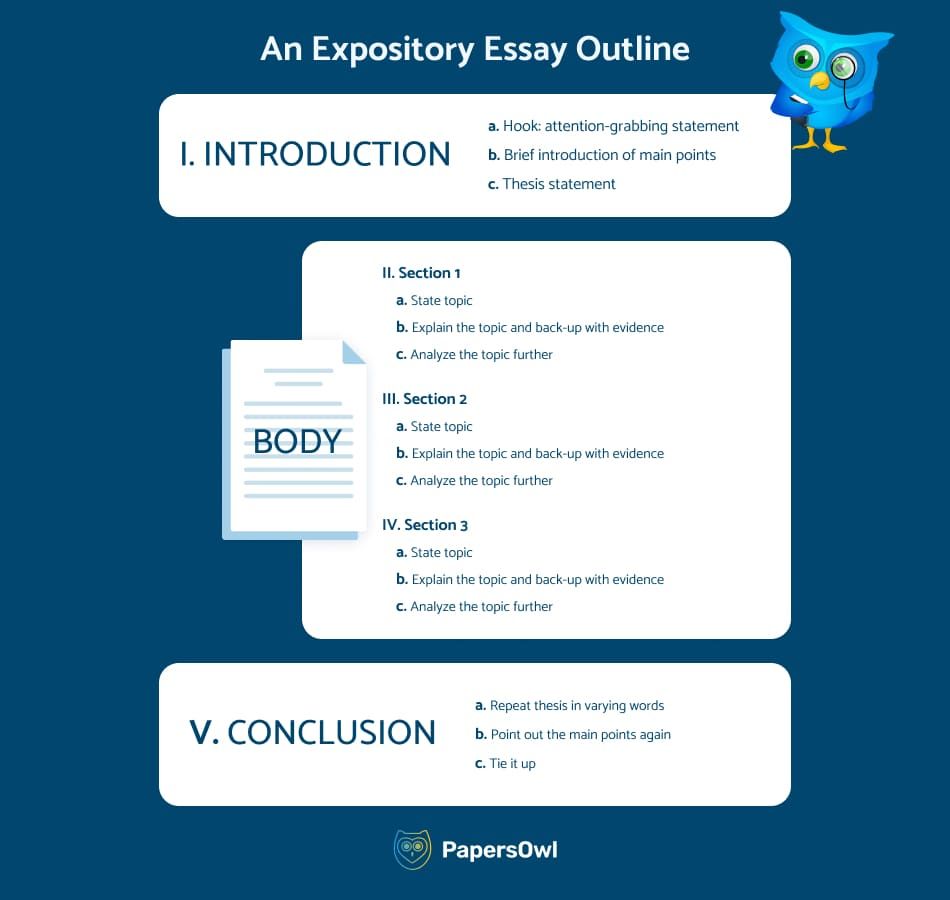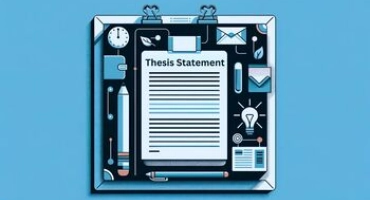How to Write an Expository Essay
Table of contents
- 1 What Is An Expository Essay?
- 2 What Is the Purpose of Expository Writing?
- 3 Choosing a Type of Expository Essay
- 3.1 Expository Essay Topics about Culture
- 3.2 Expository Essay Topics about Music
- 3.3 Expository Essay Topics about Education
- 3.4 Expository Essay Topics about History
- 3.5 Expository Essay Topics about Literature
- 3.6 Expository Essay Topics About Social Issues
- 3.7 Expository Essay Topics about Psychology and Philosophy
- 3.8 Controversial Expository Essay Topics
- 3.9 Expository Essay Topics about Science and Technology
- 3.10 Expository Essay Topics about Health
- 3.11 Expository Essay Topics about Ethical Issues
- 3.12 Expository Essay Topics About Social Problems
- 3.13 Expository Essay Topics for Middle School
- 3.14 Expository Essay Topics for High School
- 3.15 Expository Essay Topics for College
- 4 The Expository Essay Structure
- 5 Steps to Write Expository Essays
- 6 Structure of an Expository Essay Outline
- 7 An Expository Essay Format and Style
- 8 What is a Good Expository Essay Outline Example?
- 9 Conclusion
When it comes to writing an expository essay, it can be a challenging task that requires researching, analyzing evidence, and organizing information in a structured manner. To help make the process easier, Papersowl provides expert guidance on the structure and requirements of a successful expository essay.
What Is An Expository Essay?
There are many essay writing types, including descriptive, persuasive, contrast, effect, and personal opinion essays. As explained earlier, a good expository essay is an explanation, investigation, or exposition for clarification. It is different from a descriptive essay or a definition essay. The main difference between this type of write-up and an argumentative essay is that the tone used in an expository essay is neutral. However, in an argumentative essay, the style must highlight the position taken before the argument is presented.
Ideally, an expository essay aims to make the reader aware of all the key points in the article. It is different from descriptive writing.
What Is the Purpose of Expository Writing?
According to the definition of an expository essay, this type of writing aims to inform and clarify a particular topic. Its primary goal is to present facts, information, or opinions. This should be done in a clear, concise, and straightforward manner. The academic tone does not have the purpose of persuading.
It is commonly used in academic settings, such as in research papers, essays, and reports. It is also used in everyday life in instructional manuals, news articles, and online blogs.
One of the key features of expository writing is its focus on clarity and critical thinking. The writer must present the information in a way that is easy to understand. They should also provide clear and detailed explanations of complex concepts to ensure the reader grasps the topic.
Another crucial aspect of expository writing is the use of factual information to support the writer’s position. By citing credible sources, the writer can provide evidence that supports their argument. Presenting facts is particularly important when discussing scientific theories or historical events.
Overall, the goal of the entire essay is to help the reader gain a better understanding of a specific topic or concept. It effectively bridges the gap between experts and the general public. It provides a means for complex ideas and information to be communicated clearly and concisely. It also allows the reader to understand the position that the writer takes.
By presenting information in a straightforward and accessible manner, expository writing enables readers to develop informed opinions. They can then make well-informed decisions.
Choosing a Type of Expository Essay
The format of expository essays mostly features words such as “define” or “explain”. For example, “Write an essay on how to curb global warming.” In this case, you must “explain” the ‘measures that can be implemented to help minimize climate change and its effects.’
If you noticed, no instruction requires you to form an opinion or argument on whether or not there is global warming. However, explaining a certain topic is challenging.
It is paramount to know the various types of expository essays.
- Cause and Effect Essays
Outlines reasons that cause something and then discusses its results and effects.
- Problem and Solution Essays
They highlight all the problems associated with a particular situation and suggest solutions to those problems.
- Classification Essay
This sorts things out things into different categories based on the pre-defined criteria of each type.
- Comparison or Contrast Essays
It focuses on similarities and differences between objects, events, or notions.
- Definition Essays
They explain a complicated concept.
- Process Essay
A process essay, a “how-to-essay, ” explains the procedures involved in doing something.

Expository Essay Topics about Culture
Culture has always been a prevalent aspect of people’s lives, which makes it a great expository essay topic for students. You can select one direction and narrate about local cuisine, the country’s folk music, a certain poet’s writing, and anything that would be suitable for a subject. Without knowing the distinctive features of such an essay idea, it might be complex to come up with a decent title. The options that you see below are some of the most intriguing and exciting within the cultural field. Consider that even using our sample expository essay topics, you need time to complete the assignment, so start early.
- Development of Jewish culture
- Why is Oriental culture that different?
- How does gambling affect culture in the United States?
- How does culture affect personality?
- Gender inequality in the culture
- Benefits and perks of multicultural education
- Industry of the culture
- Education in Chinese and American culture
- Handling media manipulation properly
- The way political and cultural issues affect you
Expository Essay Topics about Music
To add a bit of entertainment to your studies, you can write an essay about music. The imagination is wide open: talk about the influence of your favorite boys-band on American teenage culture or write a paper about the positive influence of symphony on the human brain. Specifications are completely up to you. Moreover, by picking something of your interest, you will ease your mind and decrease the workload.
- Connections Between Different Genres
- Can Music Be Considered a Propaganda?
- Advancement Of Sound Production
- Correlation of Tunes of Your Motherland and Foreign Countries
- Evolution Of Tunes
- Tunes And Other Types Of Media Comparison
- Explanation of High Cultural and Low Cultural Tunes Explained
- How Tunes Shape The Society Today
- Current Key Points of Itunes Production
- The Connection Between Poetry And Tunes
Expository Essay Topics about Education
The field of education is pretty broad. You can turn to different branches of knowledge, their sources, and teaching methods. Choosing this option is a nice idea if you don’t want to put that much effort into doing deep research. Remember that your goal is just to explain and describe one of the processes that are anyhow connected to the educational activity. Below, you’ll see several offers from us. One of them may even become the basis of your expository.
- Why Higher Education Has Huge Positive Effect On Career
- Traditional Versus Online Learning
- The Essential Meaning of Homework
- Teaching: a Complete Struggle or a Noble Profession
- Why People With A Higher Degree Get The Job First
- How to Come Up With a Decent Title for Your Essay?
- The Future Changes of Literature and Its Impact on Society
- How Can You Complete a Perfect Paper?
- How Learning Foreign Languages Benefit Your Life
- Difference between literate and illiterate individuals

Expository Essay Topics about History
Similar to previous suggestions, history has a variety of essay options. You can start from the very beginning of time or select a subject out of current events. Any point on the world’s timeline would be both — interesting for the author to describe and for the audience to read. Make sure to create a solid statement and provide 100% accurate shreds of evidence. In case, use some of our variations as prompts.
- The Changes in the Economy after Titanic Sinking
- Spanish-American War: Cultural Effects
- What caused the Battle of Germantown?
- Child Labor within the Puritan Era
- The Impact of the US on WWI
- The Impact of the US on WWII
- Aztectimes Religion
- The Great Depression And Unemployment Of Women
- How the Industrial Revolution Impacted the Planet
- The Outcomes and Consequences of the WWII
Expository Essay Topics about Literature
School always means lots of reading as much as writing. At some point, you will receive an assignment with the descriptive task. You may talk about the main idea of a certain drama or compare the literary features of several works. Although learners frequently get such homework, narration about literature would be harder than other good expository essay topics. For starters, you have to read the whole book to be able to create a title for your expository essay and analyze the writing. Mainly, remember to stay focused and provide enough details.
- Romeo and Juliet: explaining the use of language in Shakespeare’s masterpiece
- Examples of Dramatic Irony in Shakespeare’s Plays
- Two Examples of Figurative Language and the way it’s implemented in Literature
- The Causes and Clarification of Hamlet and Claudius Dispute
- The Lesson I’ve Learned from My Favorite Shakespeare Play
- The Development of Women Role in Literature
- Opinion Personal Opinion on Character development in Ophelia
- Personal Impression of Romeo and Juliet
- The Importance and Effect of Huge Poems on individuals
- The Author that Changed Your Lifestyle The Most?
Expository Essay Topics About Social Issues
If you’re interested in the way society works and how it correlates to individuals, picking social issues as your expository topic would be suitable action. It gives lots of opportunities to describe and explain certain complications, current problems, and specific processes and elements. You can also account for anthropological and psychological issues when they relate to the social aspect. Be aware that you will need plenty of data and the skill to manage it wisely. First, start with an outline, add a description to each paragraph you’re going to write, and then form a solid essay step-by-step. If needed, apply to the topics proposed by us.
- What Problems Do Young Individuals Regularly Face?
- Can You Use Poetry To Deal With Life Problems?
- Why Should Individuals Change Their Appearance?
- Social Issues: Definition and Clarification
- How Essential is the Social Structure of Childhood?
- The Way Local Community Prevents Crimes
- The View on Abortion: Is It Really Supposed to Be Regulated by Law
- Cyberbullying: The Current Condition and The Way It Affects Individuals
- Beauty Standards Appropriateness
- Does The Government Sets Proper Mandates?
- Free unlimited checks
- All common file formats
- Accurate results
- Intuitive interface

Expository Essay Topics about Psychology and Philosophy
Lots of decent expository essay topics take their place in this section. Psychology is a great part of people’s lives, careers, etc. It may be simple and clear on the one hand, but at the same time, complex and versatile on another. Needless to mention, it is one of the hardest ideas to research and requires attentiveness. Yet, it’s easier to come up with a title for an essay as they are based on the individual’s life processes.
- Modifying Lifestyle in 2 weeks: possible or just a myth?
- How to Define the Friend is Lying
- Receptivity of the concept of time by different people
- How Our Specific Features Shape Our Character
- Specifications and Distinctive Features of a Particular Region
- The Main Life-Lesson Elderly People Would Advice
- How to Reduce Stress Among Students
- Mental Disease Description
- Why Do Teenagers Tend To Be Depressed
- What Qualities You Need to Become Popular at School
Controversial Expository Essay Topics
The audience is always keen on something that makes them question the whole process; therefore, a controversial expository essay would be just the option to catch readers’ attention. Although it seems entertaining and interesting to dig in, you have to be highly professional and do accurate research. Controversial stories also require staying focused and they have to be written in detail. If you feel like you can handle it, then go for it.
- Dispute: how many negotiations are required?
- Communism as a Compound of Dictatorship
- The danger of military activity in Asia
- Art as a Way to Treat Mental Disorders
- The Effect and Outcome of Prohibitions after 20’s
- Main Points of John Kennedy’s Political Activity
- How important is IQ?
- What Causes Racism?
- Crusaders: good guys or villains?
- How can you become a good therapist?
Expository Essay Topics about Science and Technology
Technology is a crucial part of our world nowadays. Developing subjects out of this field will be exciting and interesting. Choose anything that is relevant and touches on scientific and tech aspects, and try to be specific within the narration. Even the feature perspective of technology may be suitable for your essay title or overall theme. Below are several options that we’ve created to help you to start.
- Current Influence of Tech
- Suitable Projects for Online Format
- The Way Lifestyle Changes 25 Years from Now
- Are People Truly Connected Online?
- AI: Benefits and Drawbacks
- Selling a specific item
- The Invention Of A Specific Object In Your Home
- Description of Another Planet
- Memory and How it Works
- The Causes of Global Warming

Expository Essay Topics about Health
Those students who dream of becoming doctor or nurse would benefit from selecting health as the field of their research. For starters, you will learn lots of essentials for your future occupation and provide readers with something they didn’t know before. You can connect your essay to medication, various diseases, different kinds of procedures, etc. We’ve tried our best to gather the most remarkable titles to ease your mind and quickly start the writing process.
- How Do Doctors Get Their Licenses?
- Most Common Myths
- How Does Anesthesia Work?
- How does an X-ray machine work?
- Explain Hip Replacement Surgery
- Why Chemically Induced Coma Is Important
- Ebola crisis Explanation
- The Most Complicated Surgeries
- Skin Graft: Definition and Importance
- How To Protect Yourself From Viruses
Expository Essay Topics about Ethical Issues
Living in current society, people often ask themselves why the ethical part of our culture is on such a low level. You can become one of a few learners who would share their essays on a topic like that. Tell the audience about the ethical changes in the US, show them the ways to improve the situation, or mention anything relevant to your preference.
- Caught bullying: report or not?
- Should assisted suicide be legalized?
- Is Plastic Surgery a Good Idea for Kids?
- What if your friend cheats on the test?
- Should Church And Politics Be Completely Separated?
- Should you report if your friend abuses animals?
- Should coaches earn more than professors?
- Should All Companies Increase Data Collection?
- Should the death penalty be mandatory?
- Would you tell if your friend drinks at the prom?
Expository Essay Topics About Social Problems
In comparison to social issues, social problems have a slightly different direction in the field. Here you should write your expository essay about the issues that are happening around you. For instance, global pandemic or discrimination based on the color of the skin or sexual orientation, etc. If there is anything that concerns you in terms of social activity, make it the basis of your paper and research the topic from the inside out. Apply our suggestions when you need some inspiration.
- Impact of COVID 19
- Supply chain during the COVID 19 pandemic
- Discrimination by skin color
- Green Energy Convention
- Modern Society: Healthcare Bias
- US soldiers in Afghanistan
- Remote Education Challenge
- Global Vaccination And Pandemic
- The environmental situation in Arctic Pole
- Political Polarization Increase
Expository Essay Topics for Middle School
A middle school is the first place where you get acquainted with such things as expository essays. Usually, teachers ask you to describe a simple subject to shape your writing skills and teach you the essay’s specifications. You are free to pick anything you want, as the aim of the assignment here is to let children complete the paper all by themselves. Doesn’t matter how good the quality will be, but matters how much effort you put into creating it.
- The Way You Spend the First Day of School
- The Picture of Your First Teacher
- Your Weekend with a Favorite Pet
- Your Favorite Hobby and Why
- The Best Place in the World
Expository Essay Topics for High School
When choosing expository essay topics for high school, you need to try something mature and more complex. The title may remain ordinary, but the focus has to be on a broad range of aspects. However the initial goal is to practice and get prepared for college expository assignments in the future.
- Can a dog smell fear?
- How do you manage stress?
- Aliens: real or a myth?
- How significant is the universe?
- Can people truly change for the better?
Expository Essay Topics for College
Now you’re at the final level, where you have to show all you’ve learned throughout the years. For excellent results, it’s advisable to use online writing tools for college students or ask your professor to give you more guidelines. Still, in creating expository essays for college, you have to put in much more effort.
- Can We Still Save The Earth?
- Internet Utility Dispute
- The Book That Appeals To You The Most
- The Ways Out Of Personal Financial Crisis
- Can Little Things Still Bring Happiness?
The Expository Essay Structure
Expository essay assignments are common in academic writing and can also be used in everyday life, such as in instructional manuals or news articles. The structure of an expository essay typically includes an introduction, body paragraphs, and a conclusion. Typically, it needs to be a five-paragraph essay.
-
An expository essay’s introduction paragraph sets the tone for the report and grabs the reader’s attention. It should include a thesis that provides the paper’s main focus and previews the main points to be discussed in at least three body paragraphs.
-
Each body paragraph of an expository essay should present and develop the essay’s main points. Each section should begin with a topic sentence that relates to the thesis statement and provides a clear focus for the paragraph. Supporting evidence, background information, and examples should be included in each section.
-
An expository essay’s conclusion summarises the main points made in the body paragraphs and restates the thesis statement. It should not introduce any new information or arguments. Instead, it should provide a sense of closure to the essay and leave the reader with a clear understanding of the topic.
How to Organize Expository Essays
In addition to the traditional structure, several different approaches to organizing an expository essay exist. One common method is the “compare and contrast” approach, where two or more subjects are compared and contrasted by explaining similarities and differences. Another approach is the “cause and effect” method, where the writer describes how one event or action leads to another.
Regardless of the approach used, the structure of an expository essay should be logical and easy to follow. The writer should strive to present information clearly and concisely, using evidence and examples to support their arguments. By doing so, they can effectively explain and clarify a topic for their audience.
Steps to Write Expository Essays
In most cases, your tutor will assign you a topic to write on; however, choosing the right topic is crucial when you have to develop your topic. You should always cover an issue you are conversant with since it will be easier to explain the case to your readers and will need minimal research.
The two crucial aspects of your write-up that form the hook for an expository essay are the topic and statement of thesis. These two things strike your reader’s attention and determine if they will be triggered to read your entire paper. Thus, it is always advisable to choose an appealing topic and a good thesis statement for an expository essay.
Another critical aspect is maintaining clear and logical transitions between the introduction, body, and conclusion of the expository essays.
Lastly, ensure that everybody’s paragraphs feature evidential support. This means that each expository essay body paragraph should be limited to the exposition of one general idea. This gives your reader clarity and direction.
Step 1: Select a Topic
Brainstorm a list of topics you’re interested in. Then narrow down the list of the good expository essay topics you feel would be easiest to write and that which is manageable within the required word count.
Step 2: Write a Thesis Statement
If you are used to writing argumentative papers, you will likely take a strong position on the topic or a particular idea. However, this should be the case with an expository essay. Here, your thesis statement should only give an insight into what you are writing about and why it is important.
Step 3: Select Your Method of Development
This is the most important part of essay writing. Determine the type of expository essay you will be writing. Is it compare and contrast, process analysis, cause and effect, or other types?
Step 4: Organize Your Ideas
Before you begin writing the body section, you must clearly understand how to plan an expository essay. In this case, you should list the major divisions to be discussed in the main paragraphs and the direct support for each body paragraph.
Structure of an Expository Essay Outline
Although writing any great essay is primarily creative, it should have a clear structure and plan. The structure is one of the most important elements because it involves highlighting the main meaningful elements of the text and establishing logical connections between them. An expository essay outline includes an introduction, body paragraphs, and a conclusion. Your outline should show which three main arguments you want to discuss in each paragraph.
Usually, the introductory part of any essay is similar to each other. If, even on this part, the idea of writing an outline for an expository essay scares you, or if you have particular questions, don’t hesitate to contact expository writing services online. We will gladly take this odious problem upon ourselves.
The very structure of the text plays a very important role in expressing the structure. First of all, its main function is to interest and encourage the reader to read the covered topic. Second, it will give the reader an idea of your expository essay topic.
-
Your first sentence statement should be like a hook that captures the reader’s thoughts from the first second. A great tip for this is to start with a general statement about your topic. It can be anything, such as a certain quote, a question, an anecdote, a fascinating fact, or a dilemma that needs to be solved.
If at this point you have thoughts like, “who would write me an essay,” then don’t worry. We already have a solution. That way, after learning something new in the first sentence, people will be interested to see what you talk about next. The following sentences briefly present the main points and emphasize their connection with the thesis. It is important to add that the thesis of an essay, as a rule, is also based on facts and not on one’s thoughts.
-
The main part of the essay is where the most difficulties and problems arise with understanding where to start and how to write an essay. The main part consists of one or several paragraphs. First, start with a general sentence that expresses the paragraph’s main idea. Most body paragraphs have three sections covering concepts, explanations, and any arguments that may arise. To make things easier, write out specific textual evidence from other sources that you use to support your thesis. A variety of apt quotes and paraphrases are suitable for this. It is also essential to use reliable facts. An extraordinary hint on how to write an expository essay outline is also useful here. Avoid using the first or second person. When moving from one paragraph to another, it is important to remember to use transitional words. Each paragraph should be connected by one or two sentences that demonstratively lead from one idea to the next. This is necessary to ensure the linguistic flow is maintained.
After writing the two parts listed above, you are ready to complete the text. This part of the work is also quite responsible. How is it built? Conclusion – specific and brief information about what was listed in the introduction and body. In simple words – a simplified version of the entire text. Despite its brevity, it should be a strong enough reinforcement not to spoil the general impression and all previous efforts. Here it can be useful to restate the main idea of your subject, but in different words to emphasize its importance. In addition, this technique nicely directs the reader’s attention to important things. Remind him why this topic should interest him. Do not introduce new information in this part, as this will lead to a new discussion.

An Expository Essay Format and Style
The main feature of this genre that distinguishes it from others is the provision of all relative information without the author taking any specific point of view.
Recognizing the format and style required for writing an expository essay is essential. Also, it is necessary to present details and various examples clearly and concisely. Use facts to reinforce the content of the text. If you do not understand what style to choose for writing and doubt your decision, remember whether the professor gave you a certain task. Usually, they guide you. If not, then use the well-known APA and MLA standards. If you still do not know how to choose a citation style, then realize that the topic often determines the style of writing. So, for example, if your work concerns the discussion of humanities, it can be foreign languages or history, it is better to use MLA. If the chosen topic concerns expressing ideas in psychology or social sciences, APA is the most appropriate format.
What is a Good Expository Essay Outline Example?
Below is an expository essay template that you can follow.


It is important to know that the body paragraphs of an expository essay may consist of two or more parts. The outline for expository essay includes the following:
I. Introduction
- Hook sentence to grab the reader’s attention
- Background statements
- Clear, focused thesis statement
Body paragraphs
II. Main concept 1
- Fact 1 and testimony to support the main idea
- Fact 2 and testimony to support the main idea
- Analysis
III. Main concept 2
- Fact 1 and testimony to support the main idea
- Fact 2 and testimony to support the main idea
- Analysis
IV. Main concept 3
- Fact 1 and testimony to support the main idea
- Fact 2 and testimony to support the main idea
- Analysis
V. A conclusion
- Summarize the question of the thesis
- Discuss the large significance
- Reveal unanswered question
To sum up, there are four main kinds of essays, each with its role and task. As for the expository essay, it is needed to transmit information that is based on real facts. To write it correctly, you need to play on contrasts, your strong facts should speak for themselves, and it is equally important to provide commentary analysis. Be sure to take enough time to write an outline of an expository essay. That’s how your paper will gain new colors. If you don’t have time to write this essay, you can always pay for college papers. This is a great way to get a top quality paper without spending too much time and effort.
Conclusion
In conclusion, expository writing is a challenging task. This form of academic writing differs from descriptive essays, classification essays, and even persuasive essays. However, by following the guidelines in this article, such as the proper essay structure, the different types of expository essays, and the steps to write an expository essay, you can effectively clarify a topic for your audience.
Expository writing is a powerful tool that bridges the gap between experts and the general public, providing a means for complex ideas and information to be communicated clearly and concisely. By presenting detailed explanations in a straightforward and accessible manner, expository writing enables readers to develop informed opinions and make well-informed decisions.






